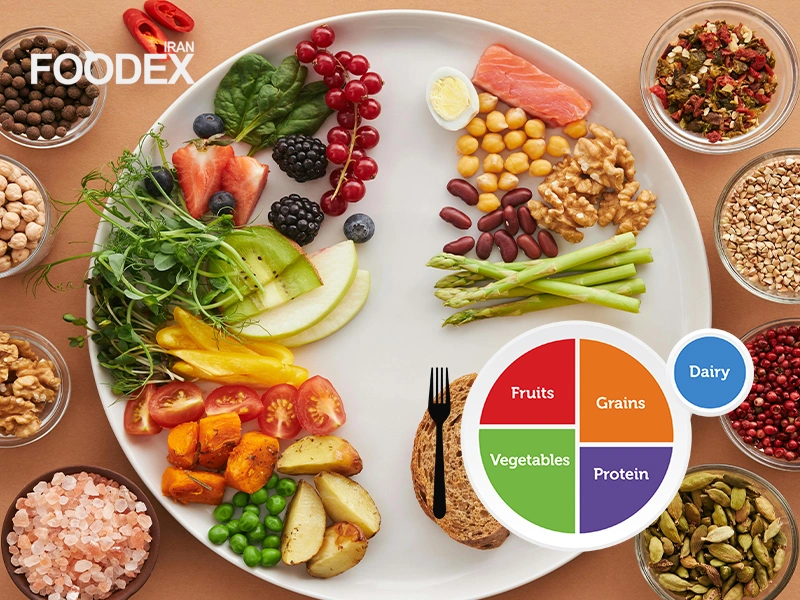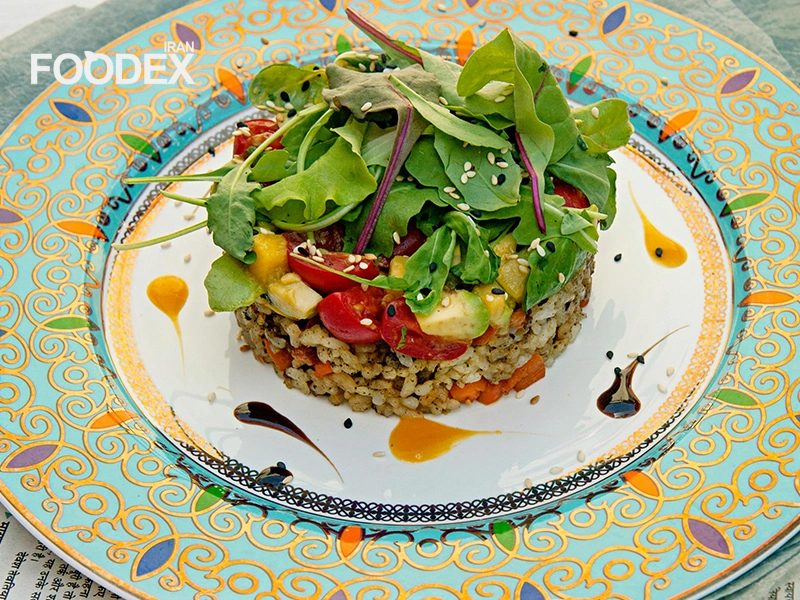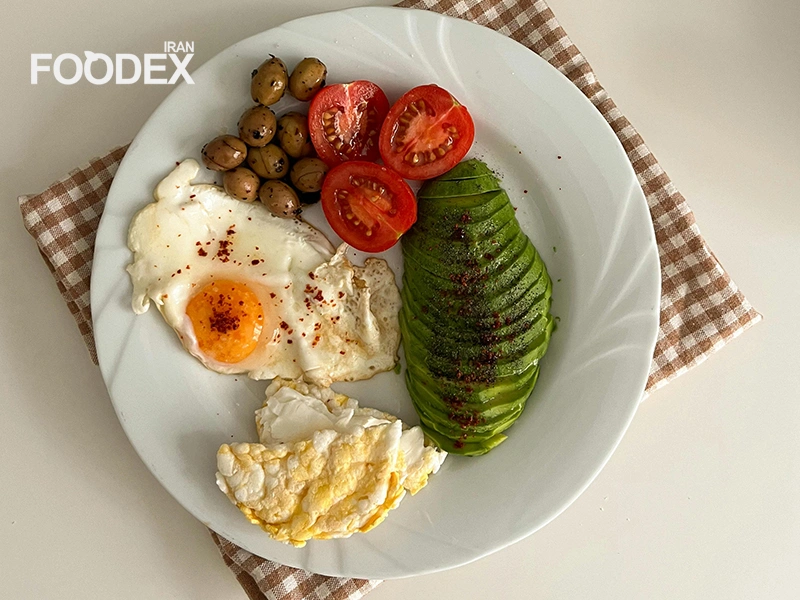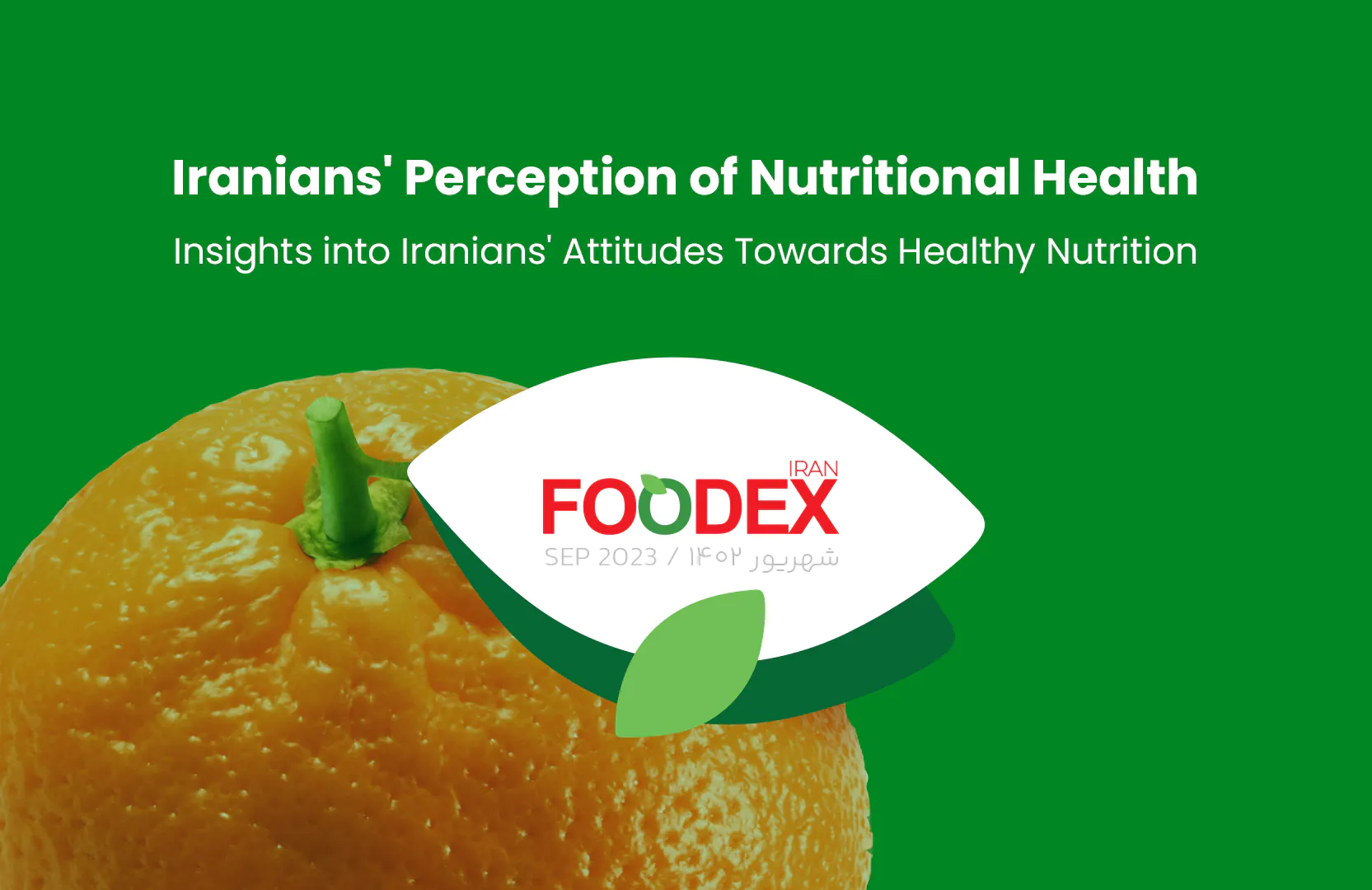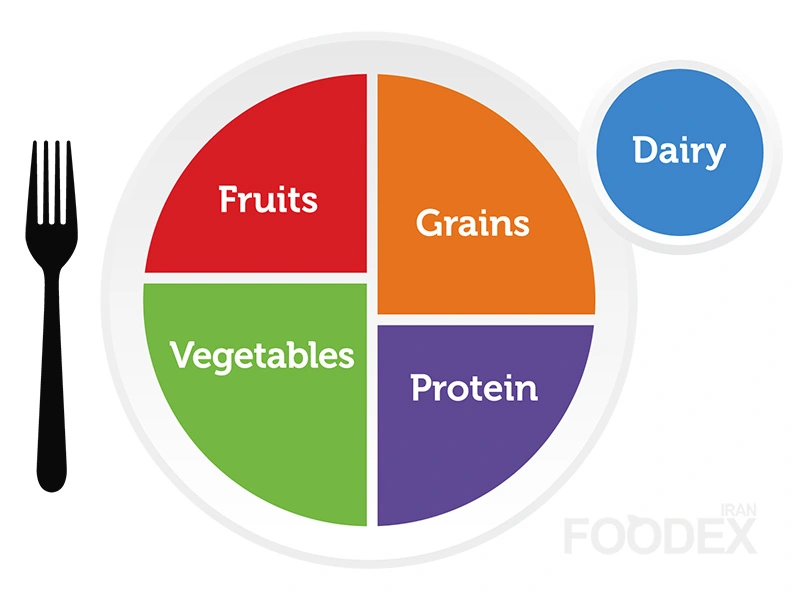Did you know that even small changes in your nutrition can make a big difference in your overall and mental state? Healthy eating habits doesn’t have to complicate your life, nor must a healthy meal plan. It’s about moving in a positive direction in small, incremental steps.
Most people today rely heavily on unhealthy foods, sometimes for comfort and sometimes for convenience. Over time, this routine can develop into severe ailments such as obesity, diabetes, and perpetual exhaustion. With a little change in your routine—like eating a lot of vegetables, cutting down on sugar, and eating healthy sources of proteins—you can make a significant contribution to a healthy life.
This article takes information from studies in the Healthy Plate for Iranians and America’s Dietary Guidelines and offers simple tips for developing a healthy eating routine. The intention is to make healthy eating simple, allowing you to boost your energy level and overall wellness.
If you’ve been searching for a healthy-eating journey but have no idea where to begin, this handbook compiled by Foodex Iran can help.
Why Is a Healthy Habit of Eating Necessary?
Proper nutrition creates a foundation for mental and physical wellness. Poor diets, even when not necessarily detrimental in an immediate manner, over the years can cause long-term maladies such as heart disease, obesity, and diabetes.
A balanced meal not only keeps disease at bay but can also boost energy, sharpen the mind, and even promote sleep. Your body needs a range of nutrients to work at its best, and in their absence, weakness and a variety of aches and pains can develop quickly.
Consider fruits and vegetables rich in antioxidants that will boost your immune system. Proteins and healthy fats will contribute to healthy maintenance of your muscle and brain function, respectively. Healthful foods don’t only serve in the short term—healthful meals have long-term wellness-promoting capabilities, too.
By making conscious food choices, one can safeguard one’s health with little in terms of extreme overhauls. Little awareness and a little work can go a long, long distance.
How Much Do Iran’s Diets Differ from Global Trends?
According to studies conducted under Healthy Plate for Iranians (Foodex, 2023), nutritional consumption in Iran is vastly different regarding worldwide standards. Unlike the global “MyPlate” model, with its balanced consumption of grain, proteins, vegetables, fruits, and dairy, diets in Iran have no diversity and balanced consumption.
Grains: Bread consumption in Iran is approximately twice that of global averages, but not necessarily a variety. Mealties include bread and rice, and a heightened consumption of whole grain and alternative grain foods could enhance overall wellbeing.
Protein: While Iranians consume less red meat than the worldwide average, chicken and legumes contribute more significantly to their protein intake. Yet, eggs and fish are not taken in proper quantities and must receive high prioritization.
Fruits and Vegetables: Eat less about international recommendations; a high boost will be required for improvements in health.
Dairy: Iran’s key sources of dairy are doogh (a yogurt drink) and yogurt, but the intake of both milk and cheese falls below international standards.
Fats, Salt, and Sugar: Iranians consume less oil than the average, but they consume more salt and sugar, both in free form and in processed foods.
The variety must be increased to achieve healthy nutrition, and a balanced diet must be developed.
Healthy Eating Habits at All Stages of Life
Nutrition is essential in maintaining overall health and disease prevention at any stage in life. Requirements differ with age, activity, and fitness level. For instance, adolescents and developing children require high calcium and protein for development. Still, older adults require high-fibre and antioxidant foods.
Let’s delve into the most important recommendations for each life stage:
Healthy Eating Habits in Childhood
In this stage, the body requires a high intake of nutrients to develop and grow. Vitamin D and calcium contribute to healthy bones. Dairy foods such as cheese, yogurt, and milk are perfect sources of these two ingredients. In addition, fruits and vegetables strengthen the immune system and supply energy.
Key Nutrients: Vitamin D and calcium for bone growth, iron for blood cell growth, and healthy fats for brain development
Important Food Sources: Dairy foods, including milk, yogurt, and cheese, and fish, eggs, and leafy greens.
Recommendations: For children, ensure proper hydration and a lower intake of processed foods with added sugar. Foods rich in calcium and vitamin D must be prioritized for bone development. Including sufficient fruits and vegetables is also significant for strengthening the immune system.
Types of healthy foods for children
Learn moreHealthy Eating Habits during Adolescent and Young Adult Stages
During adolescence and early adulthood, high activity and high growth require enough iron, proteins, and vitamin B to maintain energy and stimulate development. Nutrition foods such as meat, legumes, and fruits with healthy carbohydrates such as whole grain bread and brown rice work towards providing such energy requirements.
Key Nutrients: Muscle-building protein, iron (most important for girls during puberty), vitamin B12, and zinc.
Important Food Sources:
Red meat, legumes, eggs, nuts, low-fat foods, and whole-grain foods
Recommendations: Teens must limit sugared drinks and use healthy snacks, including fruits and nuts. Energy demand at this stage necessitates protein, iron, and vitamin B12. Red meat, eggs, and legumes must become a part of one’s diet.
Healthy Eating Patterns in Adulthood
As adults, calorie consumption reduces, yet the body still needs significant nutrients. Consumption of foods with fewer calories and less fat but high in fruits, vegetables, and healthy fats, including avocado and olive oil, keeps one healthy and at a healthy weight and prevents cardiovascular disease.
Key Nutrients: Omega-3 fats for cardiovascular health, antioxidants for reduced oxidative stress, and fibre for gut wellness.
Important Food Sources:
Colourful fruits and vegetables, whole foods, fish, nuts, olive oil, and low-fat foods like dairy.
Recommendations: Reduce sugar and salt consumption and replace fried foods with steamed and griddled foods. At this stage, adding fiber, healthy fats (e.g., omega-3s), and antioxidants is critical for heart health and for reducing long-term disease risk.
Healthy Nutrition in Old Age
As people age, their metabolisms slow down, and less energy is required. Protein continues to maintain muscle tissue, and fibre helps with digestibility. Eating whole-grain foods, fruits, vegetables, and antioxidant foods can contribute to mental and physical wellness and prevent long-term disease.
Key Nutrients: Muscle upkeep via protein, osteoporosis and bone upkeep via vitamins D and calcium, and healthy digestion via fibre.
Important Food Sources Include:
Whole grain foods, fat-fish, fruits and vegetables, fortified milk, and low-fat soups
Recommendations: Stay well-hydrated to avoid becoming dehydrated and maintain kidney function. As age advances, additional protein for the maintenance of muscle, additional fibre for proper digestion, and additional calcium and vitamin D for osteoporosis prevention will be required.
Focusing on nutrition at any stage in life can enhance your level of living and overall wellness. It isn’t fuss and isn’t about changing your whole routine—just healthy foods can make a big difference.
The Importance of Drinking and Hydrating
Drinking sufficient water is one of the most effective and straightforward tips for maintaining health. Not only does it help kidney function and keep a healthy body temperature, but water is also significant for healthy digestion and absorption of nutrients. According to the prescription, all people, but most specifically seniors and children, must have at least 6 to 8 glasses of water daily.
Healthy Nutrition in Exceptional Situations: Pregnancy, Lactation, and Long-term Illnesses
Special situations such as pregnancy, lactation, and living with long-term disease alter the body’s nutritional requirements. In such scenarios, nutrition is not merely about consuming a quota for a day but also about supporting overall and specific wellness. Below is real-life advice for each scenario.
Healthy Diet during Pregnancy
During pregnancy, your body will require increased nutrition for your growing baby, not twice your current intake, but smarter, nutrition-filled foods.
Folic Acid and Vitamin Supplements: Consumption of foods rich in folic acid, such as leafy greens or cereals with folic acid added, can prevent birth defects. Vitamin C and Vitamin D contribute towards enhancing immunity and developing strong bones.
Protein and Iron: Body requirements for additional iron include blood production. For a source of iron, use a source of lean red meat, such as legumes. If you’re not consuming meat, consult a medical practitioner for iron supplements.
Healthy Diet for Lactation
Breastfeeding demands additional energy and fluid intake to produce milk.
Adequate Fluids: Always keep a water bottle nearby to stay hydrated.
Simple and healthy foods: Fresh fruits and nuts can be a source of energy at such times.
Avoid certain foods: Caffeine and spiciness, both of which can impact the quality of breast milk, must be avoided.
Diet and proper nutrition for a healthy heart
Learn moreHealthy Nutrition for Chronic Illnesses
Nutrition plays a significant role in managing symptoms and general wellbeing for individuals with long-term medical conditions, including high blood pressure and diabetes.
Diabetes: Control blood sugar by consuming foods with high fiber and less sugar. Choose whole-grain foods over white bread and white rice.
High Blood Pressure and Cardiovascular Health: Reduce salt consumption and eat foods rich in potassium, such as bananas and spinach, and healthy fats, such as olive oil.
Boosting Health in Acute Illnesses: For ailing persons with acute diseases, such as cancer, antioxidant foods, including berries or leafy, dark-coloured vegetables, can help boost immune function.
By making responsible nutritional choices, one can significantly enhance one’s overall wellbeing and quality of life at any stage, including specific dietary requirements for any medical necessity.
Recommendations for a Healthy Habit of Eating
Consult with Doctor First: Consult your doctor initially, and make any nutritional modifications under your doctor’s supervision in a manner that will make them compatible with your medical needs.
Choose Simple and Whole Foods: Fresh and homemade foods are most often a healthy alternative to processed foods, so choose whole, unprocessed foods first.
Supplements: If your doctor diagnoses specific nutritional deficiencies, discuss taking supplements to correct your body’s needs with him.
How Can Healthy Habits in Nutrition Be Incorporated in Everyday Living?
Understanding the importance of healthy nutrition is one thing, but practicing it is a new challenge. To make healthy nutrition easier to make a part of your life, even when beginning, try following these simple tips:
1. Start with Little Things
Making significant changes in your diet can be intimidating, so it’s best to start with little and go slow. For instance, don’t try to overhaul your meals in one go; begin with little changes. For example, if your morning routine consists of white bread, start with whole-grain or multigrain bread. All such little steps can make your transition towards a healthy diet easier.
2. Eat Fresh and Fresh Foods
A diet rich in unprocessed, freshly prepared foods, including fruits and vegetables, introduces vitamins, minerals, and fibre into your life. Fiber aids in digestion and controls blood sugar. Begin with simple additions such as fruits and vegetables to your meal. Have a plate of steamed vegetables or a new salad for your traditional meat and rice lunch. Simple additions such as these can contribute towards healthy living in the long run.
3. Reduce Consumption of Processed Foods
Processed foods, including soft drinks, chips, and fast foods, contain excessive trans fats, sugar, and salt, making them susceptible to heart disease, diabetes, and obesity. Gradually switch your intake of such foods to homemade or freshly prepared foods. Simple homemade foods, including soups and salads, can have high nutritional value and make you healthy overall.
4. Be Mindful of Portion Sizes
Even when one eats healthy foods, portion size is in question. Overeating can cause weight gain and indigestion. Maintain portion control by portioning yourself with little parts that will satisfy your hunger but not make you full. For instance, having a bulky, big meal in small parts will provide sustained energy.
4. Home Cooking and Planning for Time
Cooking at home affords one complete mastery over ingredients and preparation techniques. By preparing your meal yourself, you can restrict unhealthy fats and sugar and maximize nutritional intake. If you don’t have much spare time, you can use quick and simple recipes, such as chicken, avocado, and veggie salad, for a healthy and speedy meal.
These practical tips allow you to gradually build healthier eating habits that improve your wellbeing without requiring drastic lifestyle changes.
Meal Planning: How to Have a Healthy Diet
Whether you’re altering your diet in minor or significant ways, it’s easy to forget when and how to do it. One of the most effective ways to keep your diet healthy is through meal planning. By planning your meals in advance, you can enjoy a balanced and healthy diet throughout the week.
Why Is Meal Planning Important?
Meal planning helps you make smarter grocery store purchases and reduces the temptation to order unhealthy foods when dining out. With a planned schedule, you’ll be more likely to stick to nutritious meals and avoid high-calorie, unhealthy options. Even when you’re pressed for time, having a simple meal plan and grocery list can reduce the stress of deciding what to eat.
How to Begin Planning Meals
Dedicate one day each week for meal planning. On that day, decide on your meals for the week and purchase all the necessary ingredients. To avoid monotony, ensure that your meal plan includes a variety of foods that you find enjoyable.
For example, you could designate one day for salads, another for homemade soups, and another for grilled dishes with vegetables. This variety keeps meals interesting and helps you get a wide range of nutrients.
Healthy Nutrition and Greater Psychological Wellbeing
Healthy eating improves physical health and plays a crucial role in enhancing mood and mental wellbeing. Eating nutrient-rich foods gives your body the necessary fuel to enhance mood, reduce stress, and sharpen mental focus.
The Role of Nutrition in Maintaining Mental Health
Certain foods can boost your mood and alleviate anxiety. For example, foods rich in omega-3 fatty acids, such as fish and walnuts, are known for reducing symptoms of depression and anxiety. Similarly, foods high in vitamin B, such as leafy greens and legumes, help lower stress and improve overall mood.
Tips for Staying Motivated on the Road to Healthy Living
It’s natural to experience dips in motivation and cravings for unhealthy foods during your journey to healthier eating. The key is to view these moments as part of the process and commit to getting back on track.
Set Short-term and Long-term Goals
Setting goals helps maintain focus and motivation. For instance, a short-term goal could be to eat healthy meals three times a week, while a long-term goal could be improving heart health or reaching a specific weight. Clear objectives allow you to track progress and celebrate successes.
Seek Out Motivation and Support
Motivation can diminish when you’re on the journey alone. Partnering with a friend or family member can help you stay accountable and motivated. You could even create a friendly competition or food challenge to encourage each other to eat healthily.
Reward Yourself
Celebrate your achievements by rewarding yourself. This could be something minor, like buying a new book, enjoying a rest day, or treating yourself to a meal at a healthy restaurant. Rewards make the process more enjoyable and help maintain long-term motivation.
By incorporating meal planning and motivation strategies into your routine, you can establish healthy eating habits that improve your physical and mental wellbeing.
The best healthy nutrition for students in schools for different ages
Learn moreFinal Thoughts at Foodex
Healthy eating ensures overall bodily wellness and can even enhance one’s energy, mood, and mental function. In its “Health Plate Report” regarding Iran’s nutritional intake, the present dietary intake in Iran is disparate from a range of global standards. High consumption of bread and salt, the consumption of red meat, fish, and fruits, and lack of variety in whole grain and low-fat dairy intake exhibit a need for nutritional behaviour change.
There is, however, a lot of hope. Society and its citizens can make a big impact on health and life, one little change at a time. Simple shifts such as switching to whole-grain bread in place of white bread and adding an added portion of fruits and vegetables to a meal can contribute positively to one’s physique and mental state.
Frequently Asked Questions About Healthy Eating
Is taking supplements a necessity?
A balanced, mixed meal will suffice for all your nutritional needs, and most will not need supplements. However, your doctor may sometimes recommend supplements for individual deficiencies (e.g., vitamin D, iron, and folic acid).
Are all fats unhealthy?
No, not all fat is unhealthy. For example, omega-3s in fish and walnuts are healthy fats that work for your brain and heart. On the other hand, trans fats and saturated fats, in foods such as pastry and in most foods in a quick-food outlet, can boost heart disease risk.
Should I count calories?
If you’re looking to lose weight or even maintain it, calorie tracking can help. For most, cutting sugar and unhealthy fats and simply eating foods rich in nutrition will do.
Is a gluten-free diet for everyone?
No, a gluten-free diet is for individuals with celiac disease and gluten sensitivity. Excluding gluten is not a necessity for everyone else and can limit food variety.
How can I stop eating unhealthy foods?
Keep healthy foods, including fruits and nuts, in a convenient location. When eating out, choose nutritious foods, such as grills and salads, over quick foods.
How can I not overeat at midnight?
Eating small, balanced meals during the daytime and a mild evening snack, such as fruit, can prevent one from overeating at midnight. Engaging in a little exercise, such as a walk, and not a sedentary activity, such as a long session of television, can also prevent one from having midnight pangs.
Following a simple routine and taking baby steps can form healthy eating habits and enjoy mental and physical wellbeing.
Sogand Safari
Content Manager, Foodex Iran Platform

